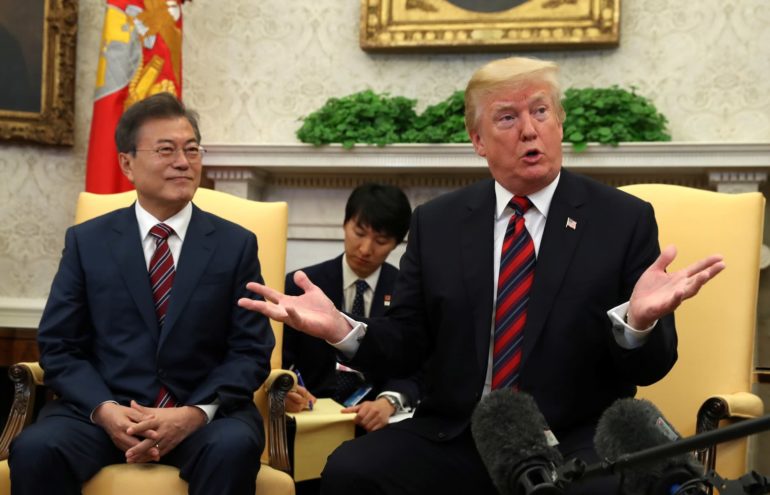
U.S. President Donald Trump meets with South Korean President Moon Jae-in at White House. Moon told Trump the ‘fate and the future’ of the Korean peninsula hinged on the talks. (Reuters)
Matthew Frank
U.S. President Donald Trump said there is a “substantial chance” the planned summit with North Korean leader Kim Jong-Un won’t happen in Singapore on June 12.
“If it doesn’t happen, maybe it will happen later,” Trump said as he held a meeting with South Korean president Moon Jae-in on Tuesday afternoon. “That doesn’t mean that it won’t work out over a period of time, but it may not work out for June 12.”
The response has come after doubts that the talks would even occur. Last week, North Korea took a hostile approach threatening to withdraw from the meeting after accusing Washington of provocation.
According to North Korea’s state news agency, Pyongyang has criticized the U.S. for the annual military drills they conduct, as “provocative military disturbances.”
Kim is further upset by comments made by Assistant to the President for National Security Affairs, John Bolton, comparing the model of unilateral disarmament of North Korea to Libya.
“This is not an expression of intention to address the issue through dialogue,” Kim said. “It is essentially a manifestation of an awfully sinister move to impose on our dignified state the destiny of Libya or Iraq.”
“The world knows too well our country is neither Libya nor Iraq, which have met a miserable fate,” he said.
He added that he was offended by being compared to Libya which he says “had been at the initial stage of nuclear development,” unlike North Korea, which is “a nuclear weapon state.”
To deescalate tensions, Trump said North Korea would never be overthrown by western powers like Libyan leader Moammar Gadhafi was in 2011, if it agrees to give up its nuclear weapons.
Donald Baker, Professor of Korean History and Civilization, said he is not surprised by the tactics North Korea is wielding.
“The North are aware it is because former Libyan president Muammar Gadaffi didn’t have nuclear weapons that Libya fell,” Baker said. “North Korea has been saying for years that’s precisely why they should have nuclear weapons.”
The first test of whether things are on track will come this week when North Korea dismantles their nuclear testing facility at Punggye-ri in front of the world’s media. This is the latest sign of goodwill in the rapidly developing situation on the Korean Peninsula.
Trump said preparations were “moving along” for talks with Kim, but that there may not be enough time for the two sides to agree the parameters for talks.
Some officials believe President Moon Jae-in oversold Pyongyang’s promises when his government sent Kim’s invitation to Trump for talks in March. At the time his representatives said North Korea was “committed to denuclearization,” but recent statements from the North have generated doubts on Kim’s willingness to negotiate away his nuclear weapons.
But Trump said he believes Kim was truthful in the promises he made to dismantle his nuclear program.
“I do think he’s serious. I do think he’d like to see it happen,” Trump said.
“North Korea has a chance to be a great country and it can’t be a country under these circumstances they are living right now,” he said. “I think they should seize the opportunity.”
Moon, who has urged diplomacy in the face of a possible war, opened talks this afternoon with President Donald Trump on the U.S.-North Korea summit, saying the “fate and the future” of the Korean peninsula hinges on it.
Marius Grinius, a fellow at the Canadian Global Affairs Institute and a former ambassador to both North and South Korea, said
“They have a history of breaking promises and agreements, so everybody should take everything with a grain of salt, and be hopeful.” Grinius said. “Maybe this time Kim Jong un really means what he said. Everyone has to be very careful.”
Grinius said summits and intentions that you want to denuclearize are great, but the real devil will be in the details.
He said people will have to know how to verify that North Korea is “actually getting rid of its nuclear warheads or its missile systems which now seem to be able to hit continental states.”
These North Korea’s behaviours have happened in the past, there’s a long history of North Koreans doing something and backing out,” Grinius said. “But there are a couple of other factors out there could affect their intentions.”
Grinius said the differences between the U.S. and North Korea on how to define denuclearization and disarmament might cause hurdles along the way to achieve a final consensus.
“Even beyond the nuclear side, you’ve got issues of huge chemical weapon stocks and probably suspected biological weapons. Then there’s the whole issue of conventional forces. North Korean forces are forward deployed,” Grinius said. “There’s talks of a treaty which is a good thing, but you need to how you can make sure you have a real peace treaty, and not just a piece of paper.”
“It will mean a heck of a lot of work. In terms of summits, Trump doesn’t seem to be well prepared for it. Kim is very well prepared for it. You don’t have to be skeptical to believe that Kim Jong Un will never give up his nuclear weapons. All of these positive elements could come to none,” he said.

